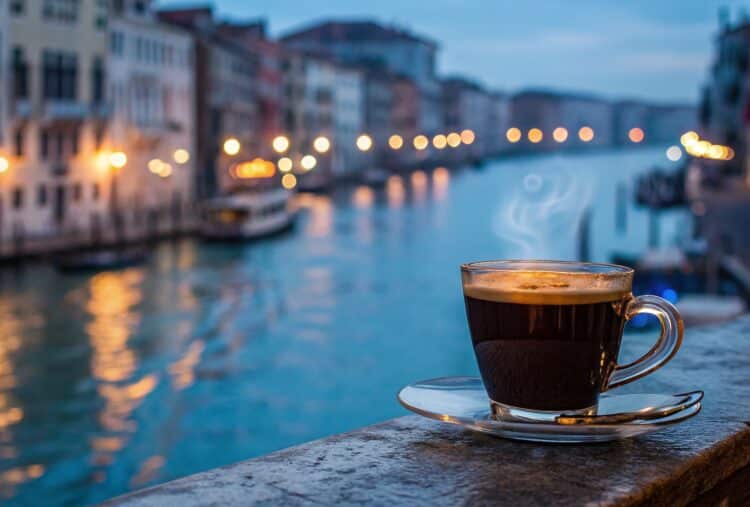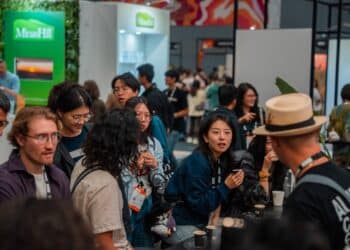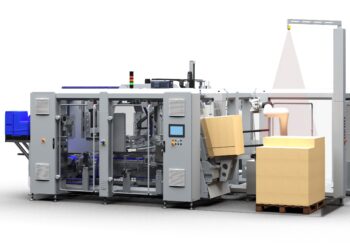A Venetian café has given a new meaning to ‘a taste of Italy’ by purifying contaminated canal water to craft espresso.
Canal Café, located in Venice, has turned the city’s famous canals into an innovative and climate-conscious source for espresso production.
The new café opened during Venice Biennale Architecture 2025, where visitors could order coffee made from purified water sourced directly from the Arsenale Lagoon.
The innovative and sustainable invention has cast a new light on urban water systems, through turning a vital resource and popular tourist attraction into one of Italy’s cultural rituals: drinking espresso.
The café was designed by New York firm Diller Scofidio + Renfro, which masterminded a concept that is sure to attract coffee drinkers and tourists – even if just for the novelty.
In an interview with Time Out magazine, Diller Scofidio + Renfro Co-Founder Elizabeth Diller highlighted the significance of the project.
‘It’s about combining the sort of pleasure of drinking beautiful espresso while also thinking about the complexity that it takes to actually have potable water,’ says Diller. ‘I will drink the first cup of espresso, and I will be the guinea pig.’
So how does the system work?
The café, located at the back of the Arsenale site, uses a hybrid natural-artificial purification system developed in collaboration with American water system engineering company Natural Systems Utilities, and the Italian environmental and water engineering company Sodai. The project was also supported by WeBuild.
A transparent pipe draws canal water into a bio-filtration system that removes sludge, toxins, and pathogens while preserving beneficial minerals.
The process is split into two paths. One stream flows through a living, plant-based system that acts as an artificial wetland populated by salt-tolerant halophytes and ‘good’ bacteria that clean the water naturally.
The other stream undergoes reverse osmosis to remove salt and micro-particles, followed by UV disinfection. Finally, the two streams are blended to provide potable water to brew a mineral-rich espresso.
Through this unification of pioneering technology and infrastructure, café goers can, quite literally, have a taste of Venice.
What makes this coffee experience even more unique is that each step of the filtration process is visible to the public. The system is trackable and monitored in real time to ensure safety and water quality.
And the ripple effects could go far beyond coffee. Venice is a UNESCO World Heritage Site and has faced decades of challenges from flooding, pollution, and the pressures of mass tourism.
Due to climate change and rising sea levels, Venice’s MOSE system was installed to protect the city from storm surges.
Director of the 2025 Biennale Carlo Ratti explained in Time Out that Venice will simultaneously be grappling with the challenges of having too much water and ensuring there is enough drinkable water.
‘We could say that the project is a prototype of the global dilemmas we face in a time of increased climate change when our infrastructures must adapt,’ says Ratti.
Those behind the water filtration system at Canal Café believe it demonstrates a working prototype for micro-scale water purification that has the potential for global applications.
At a time when sustainability in coffee is largely focused on sourcing, packaging, and emissions, the team behind the initiative believe it reorients the conversation towards water – a fundamental and often overlooked element of the coffee equation.
“Every cup of espresso is 90 per cent water,” says one engineer on the team. “If we rethink water, we can rethink everything.”
While it’s a novel concept, consumers will ultimately vote with their feet – and that comes down to taste.
According to café visitors, the espresso carries a subtle mineral quality, adding a depth to the coffee without compromising the expected flavour of a classic Italian double shot.
As the global coffee industry confronts the challenges from water scarcity to climate change, Canal Café has proposed a culturally significant and functional blueprint for a sustainable coffee brewing solution.
So it’s perhaps no surprise the installation won the Golden Lion for Best Participation at the 19th International Architecture Exhibition – La Biennale di Venezia, Intelligence. Natural. Artificial. Collective.
According to judges, it was awarded not only for its excellence in design but also for its reimagining of urban systems and cultural significance.
This article was first published in the July/August 2025 edition of Global Coffee Report. Read more HERE.





